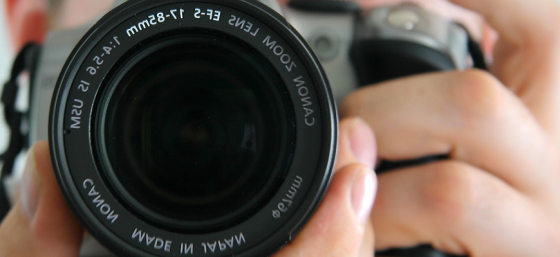I’ve had a few people ask me about the legalities of posting pictures of other people online. I thought I’d tackle the most common issue with photographs – whether you have a reasonable expectation of privacy. I’m not going to get into commercializing a person’s image or misrepresenting a person. I’m only addressing whether someone can post a picture that they took of you on their Facebook page, blog, Flickr, etc.
Pictures of You in Public
You have no expectation of privacy in anything you do in public. This includes where you go and what you do while you’re there. For example, I just got an adorable basset hound named Rosie. We take walks every day. I have no expectation of privacy regarding where we walk, what I’m wearing when I walk her, or how I react when she pulls on the leash. That’s all in plain view for everyone to see. Anyone can take a picture of us and post it online, preferably with a caption that says, “Sassy lady and her awesome dog,” and there’s nothing I can do about it (as long as they’re not misrepresenting me or commercializing my image without my consent).
If you’re in a public place and someone snaps a picture of you while you’re falling down drunk, getting arrested, picking your nose, scowling at a crying baby, or not wearing pants, there’s probably nothing you can do if that picture shows up online somewhere.
The exception to this rule is you have an expectation of privacy in places like public bathroom stalls, changing rooms, tanning salons, and doctor’s offices that may require you to be partially or completely undressed.
Pictures of You in Private Venues
When pictures are taken of you at a private event or in someone’s private home, you have to ask whether you had an expectation of privacy in each particular situation. If you attend a party where there are no rules regarding photos and everyone has their cameras out, you have no expectation of privacy if someone takes a photo of you and puts it in their online album.
Some events come with ground rules regarding photos that could create an expectation of privacy. I had a friend in college who had a Decorate Your Nipples theme party where everyone had to decorate their chest. Some people put decorations on their shirts and some people opted to decorate their skin. The rule for that party was that no cameras were allowed except during the designated picture time. At picture time, all the photos were limited to one room. If you didn’t want any photographic documentation of your being at that party, you had to go to the no-camera room.
There may be activities where there are no specified rules about photographs, but where the nature of the event or activity gives you an expectation of privacy. For example, if you and your partner make a sex tape or take intimate pictures of each other, there’s an inherent expectation that no one beside you two would see them. If you break up, your partner can’t post the pictures online and protect themselves by saying that you never agreed to keep them private.
When it comes to the question, “Can I post pictures of other people online?,” the answer is always, “It depends.” My general rule of thumb is “Don’t do anything in public that you wouldn’t put on the front page of the paper.” When it comes to photographs, the same rule generally applies because you might end up in a situation where you had an expectation of privacy but someone posted a picture of you online that they shouldn’t have. You might have a case against the jerk who posed it, but you still have to deal with the possibility that a lot of people saw a photo of you that they should have never seen.
If you want more information about the legal rules regarding social media, please check out The Legal Side of Blogging: How Not to get Sued, Fired, Arrested, or Killed. I also maintain a mailing list where I share my thoughts about being a lawyer/entrepreneur, updates about projects I’m working on, upcoming speaking engagements, and I may provide information about products, services, and discounts. Please add yourself if you’re interested. You can also contact me directly or connect with me on Twitter, Facebook, YouTube, or LinkedIn.

